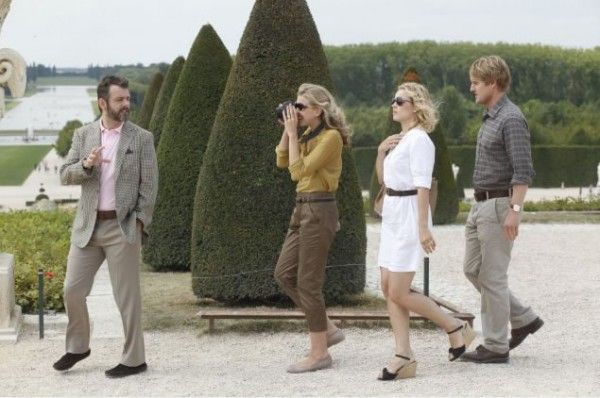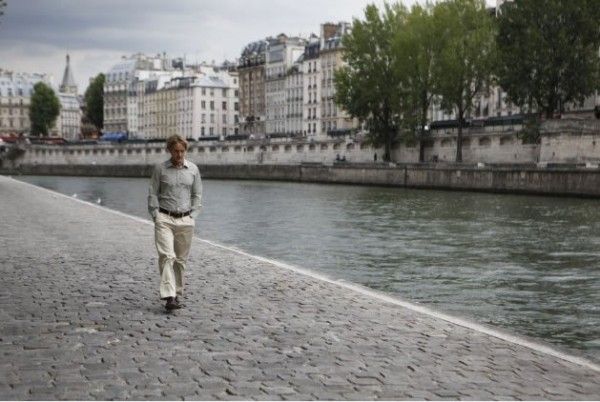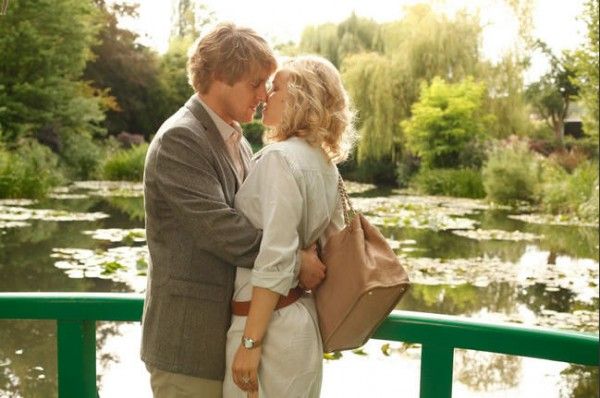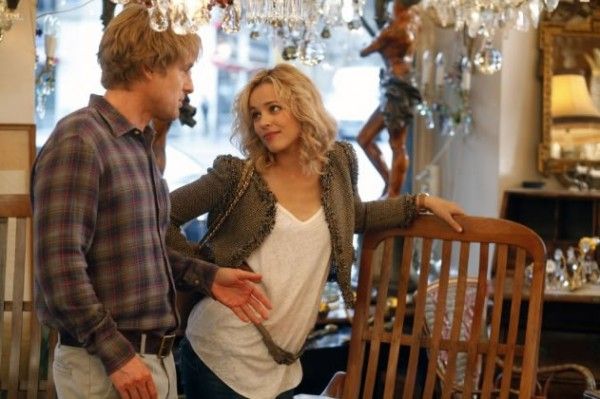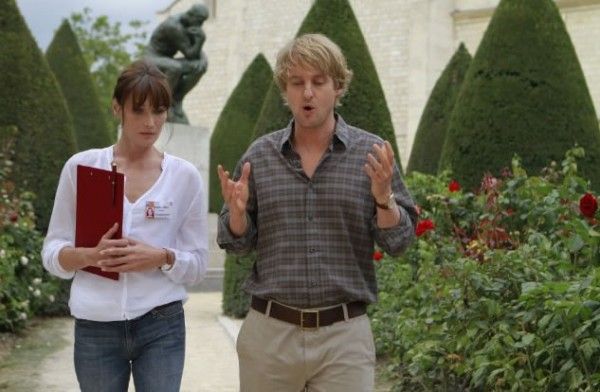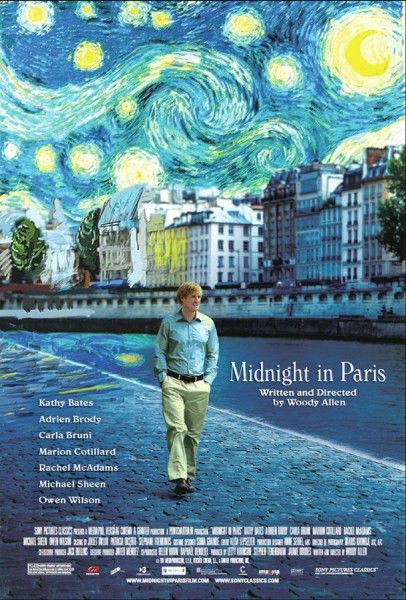In the romantic comedy Midnight in Paris, from writer/director Woody Allen, actor Michael Sheen plays Paul, an intellectual visiting Paris with his wife (Nina Arianda), while he lectures at the Sorbonne. At the same time, Inez (Rachel McAdams) is there with her fiancé Gil (Owen Wilson), who is taking time away from his successful career as a Hollywood screenwriter to pursue his aspirations to be a serious novelist, much to her dismay. When Inez unexpectedly runs into Paul, who she has had a crush on since college, she immediately finds him as charming as he is cerebral, while Gil finds him to be an insufferable know-it-all that he can’t stand to be around. As Gil is increasingly absent to focus on his writing, Paul and Inez find themselves growing increasingly closer.
At the film’s press day, Michael Sheen talked about how much he enjoyed working with Woody Allen, how amazing it was to have some of the film’s Paris locations all to themselves, how much fun his character was to play, and how he thought Owen Wilson found a really good balance between having the angst, anxiety and neurosis of a Woody Allen character. He also talked about what’s in store for his character Aro in The Twilight Saga: Breaking Dawn, and said that the talk of him doing Dark Shadows was a bit premature. Check out what he had to say after the jump:
Question: How was it to work with Woody Allen?
MICHAEL SHEEN: It was fantastic. He’s a director who has a lot of mystic, and myth and legend, and stories that surround him. Some of them are true, and some of them are not. I had been led to believe that he’s quite hands-off with the actors and lets the actors do whatever they want, but actually he was very hands-on with the actors, in my experience. His notes were really incisive and useful and helpful. I learned a lot from working with him, with the notes that he gave, so that was surprising. He’s very funny. He’s got a very dry, wry sense of humor. Now that he’s a bit older, he’s almost like a silent movie star, like Buster Keaton. He has a face that seems both funny and sad, at the same time. He always made me laugh. He’s obviously had a love affair with Paris and France for a long time, and this was an opportunity to write his love letter to the city, so to see him in the city and enjoying it so much was wonderful.
Since he’s known for not communicating with his actors, were you surprised that he did communicate with you?
SHEEN: I wasn’t aware of him not communicating. Maybe I just needed more direction than other people, but I found him very fascinating. The way he works with the actors, he just keeps wanting you to be simpler all the time, and not to try to do too much. He’s very un-modern, in a sense. He’s not interested in mining subtext and what’s actually going on underneath the surface. He wants you to play the surface, as much as possible. He wants you to constantly be reacting to what the other person is saying. He’s not interested in you improvising. He just wants you to literally go, “Oh, really? Yeah. Uh huh.” It’s quite liberating to do that and not have to worry about the inner life of the character and the subtext, and all of that. You just play the surface, and the story reveals itself. Maybe it’s the writer in him, that the thing that reveals story is writing, not acting.
What was it like to shoot in Paris?
SHEEN: It was amazing to be standing there in front of Monet’s “Water Lily” paintings. When I’ve been there before, you can barely see them because there’s so many people in the room, but it was just me, Rachel [McAdams], Owen [Wilson] and Nina [Arianda], standing there with the film crew up the other end. To have that room just to yourself is a huge privilege. You never get to do that. And then, a few days later, we were standing in front of the actual water lilies themselves that he painted. We went out to Giverny and stood on the Japanese bridge, just looking at those water lilies, and that was amazing, to keep turning up to these locations. My first scene was with Carla [Bruni], standing and looking at The Thinker in Rodin’s garden. You just can’t quite believe that you’re getting this access. It certainly wasn’t like work. It was wonderful to have that kind of access, be in these extraordinary places and have them all to yourself. We went to the Palace of Versailles and myself, Rachel and Nina were given a tour and we were shown secret corridors that Marie Antoinette had to get to her bedroom. It was just amazing to see it like that, and with such a fantastic group of people as well. The company was just wonderful. We would go out for dinners every night and go walking around the city at nighttime, singing and dancing and laughing. It was just great. For a city that is so sensual and full of romance, to be with a group of people that actually enjoyed that was the real joy of it. Rather than going back to your trailer or back to your hotel, and keeping yourself to yourself, there was a real feeling of being a company, which I think is part of a Woody Allen film experience that you don’t get with other films sometimes.
What was it like to work with Carla Bruni, the First Lady of France?
SHEEN: She was charming and wonderful. You get to spend a lot of downtime on a film set, so you end up chatting with the other actors, and it was extraordinary to be talking to the First Lady of France, in between takes. I think she’d just been on a state visit to China, so she was telling me about the places she’d seen. She’s also a singer/songwriter, so she’s an artist, a performer and this First Lady. It was extraordinary, being able to chat with her in between shooting. She was such a lovely host. She’s just wonderful, and I think she’s very good in the film.
Did you have to audition for this film?
SHEEN: It wasn’t an audition, so to speak. I think Woody likes to actually meet the person in the flesh, if he hasn’t met them before, before he casts them. So, I went to meet him. I was filming 30 Rock in New York, at the time, so I popped over to see him. And then, he just offered me the part, so that was great.
What did you like about this character?
SHEEN: I remember Woody wrote me a card and said, “This is the ultimate pedant. I think you could have fun with him.” I like to describe him as someone who’s very generous with the sharing of his knowledge. He thinks he knows a lot about everything, and he’s very happy to let you know that. Unfortunately, I didn’t have to scratch too far beneath the surface of myself to find my inner know-it-all and release it for the film. It was great to be able to play someone who’s just absolutely got no sense that he’s overstepping the mark or that he’s being a bore. It was good fun.
How much of Woody Allen is in Owen Wilson’s performance in the film?
SHEEN: I remember when we were doing Frost/Nixon, I was talking to Rebecca Hall about Vicky Cristina Barcelona, and she felt like she was Woody in that film. And, Ken Branagh played Woody (in Celebrity). Everyone who plays the main part in this kind of film, in some way, is playing an aspect of Woody. I thought Owen found a really good balance between having the kind of angst and anxiety and neurosis of a Woody character. At the same time, Owen has such a laid-back quality about him that I thought he had a really good mixture of that in it. He’s someone who you’re quite happy to go on a journey with, through the film, which he’s got to be. He’s very funny as well, and still scathing of people while seeming very likeable. Of all the people who have played Woody, I thought he was one of the most successful, in that respect.
What era would you like to go back to?
SHEEN: Well, there are many, many periods that I would go back to. I’d like to go back in a bubble of modern life as well ‘cause I wouldn’t like to die of some plague or something. But, it would be very exciting to go back to the Elizabethan era, to be around for the opening night of Hamlet. That would be great. And, there was all the intrigue of what was going on with the Secret Service in Elizabethan society and the Court of Elizabeth. But, I’d also love to be in Los Angeles in the late ‘60s/early ‘70s for the music scene and the hippie movement. I’d love to go back to Europe in the ‘20s and ‘30s, for the beginning of the Psychoanalytic Movement, and Freud and Jung, and all that was going on with discoveries in quantum physics. The whole nature of reality was changing and being challenged. I’d love to go back to Greek times and see the birth of theater and performing, in that time. It would be so extraordinary to see the need that theater came out of, in the first place. I think we could probably all learn a bit from that. I’d have my work cut out. If there was time travel, I wouldn’t have time to do all the traveling I’d want to do.
Do you think this is a very un-Woody Allen film?
SHEEN: I was struck by similarities to other films, like Manhattan. The beginning of the film is almost exactly the same as Manhattan, but Paris rather than New York. There was a feeling of Zelig about it, with the idea of going through the screen and being part of the world of the film. There was a feeling of a few films that I’ve seen him do, but in some ways, it’s the most romantic of his films. It’s the most unbridled, romantic film, not just in terms of the love aspect of the romance, but the true romance of a love for the past and a love for a period of time. It’s such a romantic notion, the idea of all these artists being together and sharing their lives together. It’s the most romantic of his films, in that respect, and maybe a very personal film for that reason as well.
What can you say about what you’ll be doing in The Twilight Saga: Breaking Dawn?
SHEEN: It’s the same part that I played before – Aro.
Was there anything you got to discover in playing him this time around, that you hadn’t learned the last time you played him?
SHEEN: He’s more of a presence in these films than he was in New Moon, so I got to explore the character a bit more and probably fleshed it out a bit more. I don’t think that there’s anything that I learned. I just was able to go into the insanity of the character a bit more. I got to show what’s under the surface a bit more this time, which was fun.
How was Bill Condon to work with, as a director?
SHEEN: Bill was wonderful. He was terrific. He’s a very, very friendly, warm person. He obviously has a very varied and interesting body of work, and brought that to bear. He made everyone feel very comfortable. It must be quite hard, coming onto a film where people have already been together for a long time. Each film is a different director and you think, “What’s this one going to be like?” But, everyone really warmed to him and thought he was terrific. I think he did a really good job. It was a huge organizational thing. We had something like 40 new characters being introduced in this film, and the big battle scene took about four or five weeks to film. It was a huge undertaking, and he handled it brilliantly.
When a new director comes on and you already know the characters from having done previous films, do you feel like you know the characters more than the director, or does each director really bring something new out of you?
SHEEN: Personally, I was only on New Moon for two weeks, so it’s not like I got used to it. But, for the other actors, there’s probably a wariness about, “Is this person going to come along and not really get what it is we’re doing, or are they going to try to change it too much?” For a director coming on board, I would imagine there’s the pressure of wanting to make your mark and be different to what other people have done, but at the same time, not wanting to go against the flow of the whole series. I would imagine it’s quite a difficult balance to strike, but everyone seemed very happy on it and seemed to enjoy working with Bill.
What are you going to be doing in Dark Shadows?
SHEEN: I’m not in Dark Shadows.
Was that just misinformation?
SHEEN: No, it was something that got talked about, but it’s not happening. It was a bit premature.
Have you recently completed any other projects, or are you going to be starting anything soon?
SHEEN: I’ve been working on a project for two years, that I just did over Easter, called The Passion of Port Talbot, which is my hometown. I did a non-stop, 72-hour performance of a modern-day version of The Passion of Christ, that took place in locations all over the town. I worked with the community of the town, so we had thousands of local people involved in it. It began at dawn on Good Friday morning, with 300 people watching the baptism of this character, and ended with 12,000 people and being crucified on the Sunday night. I played a character based on the character of Jesus, but not Jesus. It was a modern, contemporary story set in my hometown.
What is the best advice you’ve ever received?
SHEEN: I don’t know if it’s the best advice, but it’s something that has stuck with me. Someone once said, “Never, ever do anything, ever,” which I haven’t stuck to. I remember someone else said to me, “Never stand up when you can sit down, never sit down when you can lie down, never lie down when you can be asleep.” Those are bits of advice that I haven’t taken, really. I’ve done the opposite of them, but they have stayed with me.

